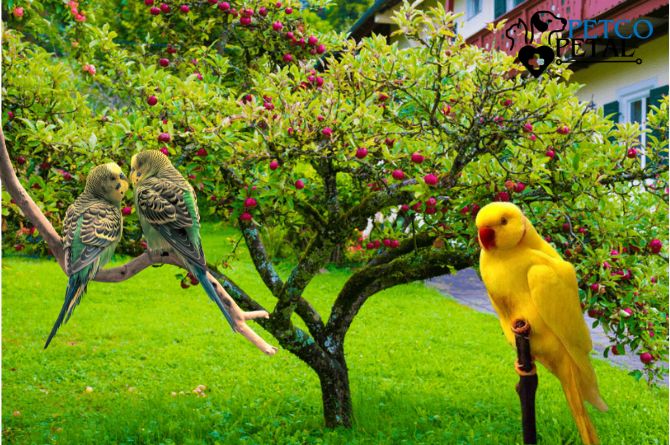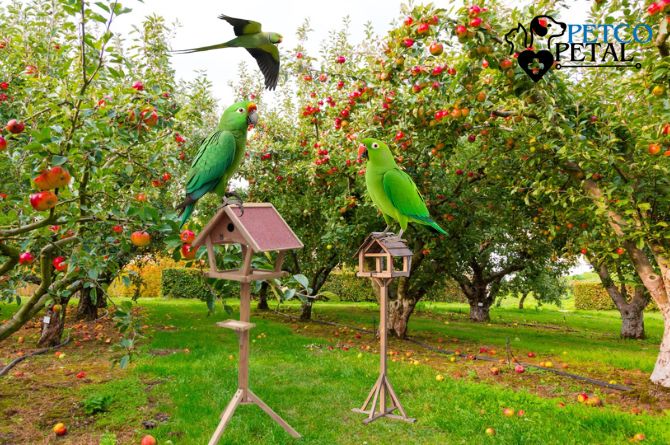Introduction
Why Bird Care is Important for Beginners:
Birds are sensitive and intelligent creatures, requiring dedicated care to thrive. For beginners, understanding the essentials of bird care is crucial to ensuring a happy, healthy pet. Proper care helps prevent health issues, behavioral problems, and stress in birds, making it easier for new bird owners to enjoy a fulfilling relationship with their feathered friends.
How Learning the Right Bird Care Tips and Tricks Can Make the Process Easier:
For those new to bird ownership, learning the right bird care tips and tricks can simplify daily tasks and help avoid common mistakes. These practical tips provide guidance on everything from feeding and cage setup to socialization and health monitoring, ensuring a smoother and more enjoyable bird care experience for beginners.
Understanding Your Bird’s Basic Needs
A. Choosing the Right Bird for Beginners
Overview of Beginner-Friendly Bird Species:
When starting out, it’s essential to choose a bird species that matches your experience level and lifestyle. Popular beginner-friendly birds include budgies, cockatiels, and canaries. These species are generally more adaptable, easier to care for, and have pleasant temperaments, making them ideal for those new to bird ownership.
Importance of Understanding Species-Specific Needs:
Each bird species has unique requirements, including dietary preferences, social needs, and environmental conditions. Understanding these species-specific needs is crucial for providing proper care. For instance, while budgies thrive in social environments and enjoy human interaction, canaries may prefer solitude and a quieter setting. Tailoring your care approach to your bird’s specific needs will help ensure a healthy and happy pet.
B. Setting Up the Perfect Cage Environment
Discuss the Ideal Cage Size and Setup:
The cage is your bird’s home, so it’s vital to choose the right size and setup. The ideal cage should provide ample space for your bird to move around, stretch its wings, and explore. A general rule is to select a cage that is at least twice the wingspan of your bird. Horizontal space is especially important for birds that like to fly within their cage.
Importance of Perches, Toys, and Nesting Materials:
To create a stimulating environment, include various perches, toys, and nesting materials in the cage. Perches of different sizes and textures help maintain your bird’s foot health and prevent boredom. Toys provide mental stimulation and encourage natural behaviors like foraging and chewing. Nesting materials can be offered to birds that enjoy building nests, contributing to their comfort and well-being. A well-equipped cage not only keeps your bird entertained but also supports its physical and mental health.
Daily Bird Care Routine

A. Feeding Your Bird
List of Healthy Bird Foods:
A balanced diet is crucial for your bird’s health. Provide a variety of fresh fruits, vegetables, high-quality bird pellets, and seeds. For example, apples, carrots, and spinach are great for adding essential vitamins and minerals to your bird’s diet. Seeds and nuts can be offered in moderation, as they are high in fat. Including a mix of different foods ensures your bird gets all the nutrients it needs.
Tips on How to Avoid Common Feeding Mistakes:
Avoid overfeeding seeds, as they can lead to obesity. Refrain from offering foods that are toxic to birds, such as avocado, chocolate, and caffeine. Always provide fresh food and water daily, and remove any uneaten portions to prevent spoilage. It’s also important not to suddenly change your bird’s diet; instead, introduce new foods gradually to avoid digestive upset.
B. Maintaining Cleanliness
Daily and Weekly Cleaning Tasks:
Maintaining a clean environment is essential for your bird’s health. Daily tasks include changing the water, removing droppings from perches and cage liners, and washing food and water dishes. Weekly, you should deep clean the cage by washing all surfaces, replacing bedding, and sanitizing toys and perches. This routine helps prevent the buildup of bacteria and reduces the risk of infections.
Using Safe Cleaning Products for Birds:
When cleaning your bird’s cage, use bird-safe cleaning products that are free from harsh chemicals and fumes. Vinegar and water solutions or specially formulated bird-safe cleaners are excellent choices. Always rinse thoroughly to ensure no residue is left behind, as birds are highly sensitive to chemicals. Keeping your bird’s environment clean and safe is key to preventing respiratory issues and other health problems.
C. Monitoring Health and Behavior
Recognizing Signs of Illness:
Early detection of illness can save your bird’s life. Watch for signs such as changes in appetite, fluffed-up feathers, lethargy, or abnormal droppings. Other indicators include wheezing, sneezing, or discharge from the eyes or nose. If you notice any of these symptoms, it’s crucial to consult a veterinarian promptly.
Importance of Regular Vet Check-Ups:
Regular vet check-ups are essential for maintaining your bird’s health. Annual visits allow your vet to perform routine health screenings, catch potential issues early, and provide necessary vaccinations. Establishing a relationship with an avian vet ensures that your bird receives expert care throughout its life. Regular check-ups also provide an opportunity to discuss any concerns or questions you may have about your bird’s well-being.
Bird Care Tips and Tricks for New Bird Owners

A. Socializing and Training Your Bird
Tips on How to Bond with Your Bird:
Building a strong bond with your bird requires patience and consistency. Spend quality time near your bird’s cage, talking softly to help it get used to your presence. Gradually introduce your hand by offering treats, allowing the bird to associate you with positive experiences. Gentle petting and regular interaction will strengthen your bond over time. Remember, every bird is different, so be attentive to your bird’s comfort level and move at its pace.
Basic Training Techniques:Training your bird can be a rewarding experience that enhances your bond and makes daily care easier. Start with simple commands like “step up,” encouraging your bird to perch on your finger or a handheld perch. Use treats and positive reinforcement to reward good behavior. Consistency is key—short, daily training sessions are more effective than longer, irregular ones. As your bird becomes more comfortable, you can introduce more complex tricks, such as retrieving objects or mimicking sounds.
B. Preventing Common Bird Care Mistakes
Highlight Frequent Errors Beginners Make:
New bird owners often make common mistakes that can affect their bird’s well-being. These include overfeeding seeds, which can lead to obesity, neglecting social interaction, and placing the cage in a drafty or noisy area. Another frequent error is failing to provide mental stimulation, leading to boredom and behavioral issues like feather plucking.
Tips to Avoid These Mistakes: To avoid these pitfalls, ensure your bird has a balanced diet with a variety of foods, not just seeds. Dedicate time each day to interact with your bird, providing social and mental stimulation through training and play. Place the cage in a quiet, draft-free area where the bird feels safe and secure. Rotate toys and perches regularly to keep your bird entertained and engaged. By being mindful of these tips, you can create a happier, healthier environment for your bird, ensuring a smooth bird care experience as a beginner.
Seasonal Bird Care Tips and Tricks
A. Caring for Birds in Hot Weather
Tips on Keeping Birds Cool and Hydrated:
During hot weather, it’s essential to keep your bird cool to prevent heat stress. Ensure your bird’s cage is placed in a shaded, well-ventilated area, away from direct sunlight. Provide fresh, cool water throughout the day, and consider adding a few ice cubes to keep it chilled longer. Mist your bird lightly with water to help it stay cool, or offer a shallow dish for your bird to bathe in. Additionally, avoid overexertion by limiting playtime during the hottest parts of the day. These simple steps will help your bird stay comfortable and hydrated during the heat.
B. Winter Bird Care
Ensuring Your Bird Stays Warm During Colder Months:
In colder months, keeping your bird warm is crucial to its health. Place the cage in a draft-free area, away from windows and doors where cold air might enter. Cover the cage at night with a breathable, insulated cover to retain warmth. You can also use a bird-safe heater or heat lamp, but ensure it’s positioned safely to prevent burns. Providing extra bedding materials, such as shredded paper or fleece, can also help your bird stay cozy. Monitoring the room temperature and making these adjustments will ensure your bird remains warm and comfortable throughout the winter.
Troubleshooting Common Bird Care Issues

A. Addressing Behavioral Problems
Tips for Dealing with Biting, Screaming, and Feather Plucking:
Biting: Birds may bite out of fear, territorial behavior, or lack of socialization. To address this, avoid sudden movements and respect your bird’s personal space. Use positive reinforcement to reward gentle behavior, and never punish biting, as this can increase fear and aggression. Instead, calmly remove your hand and give the bird time to calm down before reattempting interaction.
Screaming: Excessive screaming can be a sign of boredom, attention-seeking, or environmental stress. To manage this, ensure your bird has enough mental stimulation through toys and interaction. Establish a routine for feeding and playtime to reduce anxiety. If your bird screams for attention, avoid rewarding this behavior; instead, reinforce quiet moments with praise or treats.
Feather Plucking: Feather plucking can indicate stress, boredom, or health issues. First, ensure your bird’s environment is enriching, with plenty of toys and social interaction. Check for potential stressors, such as noise or cage placement. If plucking persists, consult a vet to rule out underlying health problems, such as skin infections or nutritional deficiencies.
B. Handling Health Emergencies
Basic First Aid Tips for Birds:
Having a bird-specific first aid kit on hand is essential. If your bird experiences a minor injury, such as a broken blood feather or a small cut, you can apply cornstarch or styptic powder to stop the bleeding. For minor burns, rinse the area with cool water and avoid applying creams without vet approval. Keep your bird warm and quiet to reduce stress during an emergency, and contact a vet immediately if the situation seems serious.
When to Seek Professional Help: Certain signs, such as difficulty breathing, sudden changes in behavior, or severe injuries, require immediate veterinary attention. If your bird is lethargic, not eating, or displaying unusual symptoms like vomiting or diarrhea, it’s crucial to seek professional help without delay. Birds often hide their illnesses, so prompt action is vital. Establish a relationship with an avian vet and have their contact information readily available for emergencies. Regular check-ups also help catch potential health issues early, before they become emergencies.
Conclusion
Recap of Essential Bird Care Tips and Tricks:
In summary, successful bird care starts with understanding your bird’s basic needs, including choosing the right species and setting up an appropriate cage environment. Daily routines such as proper feeding, cleanliness, and monitoring health are crucial for maintaining your bird’s well-being. Socializing and training your bird, along with addressing seasonal changes, ensure a happy and healthy pet. Troubleshooting common issues like behavioral problems and health emergencies can prevent and address potential challenges.
Encouragement for Beginners to Continue Learning and Enjoying Their Bird Care Journey:
Caring for birds can be incredibly rewarding, and the journey of learning and bonding with your feathered friend is ongoing. As you apply these bird care tips and tricks, you’ll gain more confidence and knowledge, leading to a better quality of life for your bird. Remember, every bird is unique, and understanding its individual needs will help you provide the best care possible. Keep exploring new resources, engaging with other bird enthusiasts, and enjoying the special moments with your pet. The more you learn, the more fulfilling your bird care experience will become.

